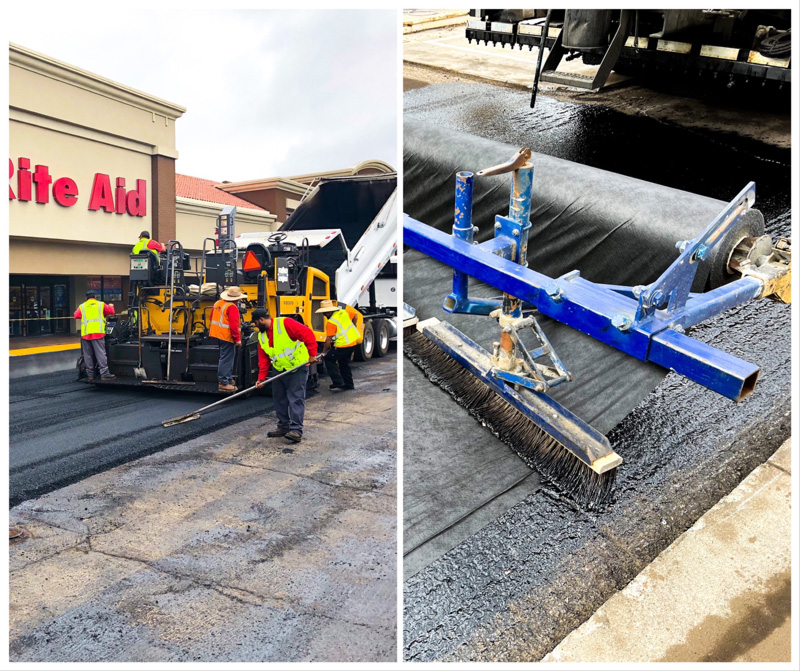
What is it?
There are two main types of overlays: asphalt and fabric/mat. In both cases, the top 1½”-2” layer of damaged asphalt is milled down to present a slightly more level surface to cover. A fabric/mat overlay is more involved in that it requires laying a binder coat of hot oil on the milled asphalt surface, installing a layer of fabric/mat over the hot oil, and then applying a layer of asphalt roughly 1¼” to 2” thick on top. The fabric/mat overlays can be broken down into two types: Petromat fabric and TruPave mat. Traditional Petromat is the older version that is made of polypropylene and polyester fibers, is black in color, and cannot be recycled. (Petromat Enviro is a newer version of Petromat that is also polypropylene-based but is recyclable and millable.) TruPave mat is made of fiberglass and polyester fibers that is white in color and can be recycled.
Why is it important?
Uneven spots, cracks, and raveling can allow water to penetrate the base layer and create major problems with the asphalt’s surface. These problems only get worse over time and traffic unless measures are taken to resolve them. Installing an overlay can help alleviate some of these issues and prevent further damage from occurring.
What do I need to know?
- Overlays have a shorter lifespan than removal and replacement – a full removal and replacement should last 20-25 years if properly maintained, whereas an overlay will only last roughly 7-10 years. When considering your options for asphalt repair, you will need to compare the cost and longevity of each of these projects
- Traditional Petromat overlays cannot be reused or recycled – if “going green” is part of your philosophy, a traditional Petromat overlay will not be the right solution for you. That fabric material cannot be properly pulverized and recycled or reused for base material and will need to be discarded in other ways
- Fabric/mat overlays are more costly – since the traditional Petromat fabric cannot be recycled during the removal process, the attached asphalt material cannot be used for base material and must be discarded in a landfill, adding both disposal fees and transport fees. In addition to these fees, additional base material must be purchased and transported to the project site since the asphalt being removed cannot be milled and repurposed. Petromat Enviro fabric and TruPave mat can be recycled, but the recyclability comes with a higher initial purchase price of the product. The increased cost of the recyclable materials generally limits their application to public works projects rather than residential or commercial applications
- Reflective cracking will reappear – cracks that extend beyond the surface layer that is removed to apply the overlay will soon reappear through the asphalt overlay as the material settles into the cracks and the ground continues to shift
When do I need to do it?
An overlay is going to be your best option when your asphalt isn’t quite ready to be fully removed and replaced yet, but is showing obvious signs of damage or wear. Throughout the asphalt’s useful lifespan, damage and wear will occur and are to be expected. But, generally speaking, asphalt that is not near the end of its life and is showing extensive cracking, raveling, wear, or other damage most likely hasn’t been properly maintained with regular repairs, patching, and seal coating. In these cases, an overlay would help to extend your asphalt’s life and would be a good investment. An asphalt surface towards the end of its lifespan should be removed and replaced instead since the condition of the substrate and base layer are unknown and could be compromised.
